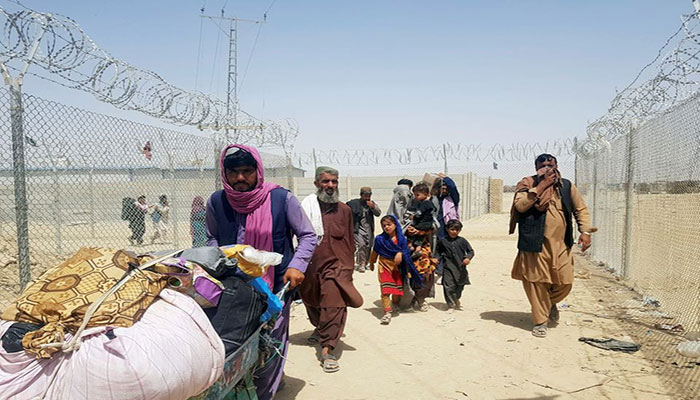Urgent action sought to protect millions of Afghans from starvation
LAHORE: SAARC Chamber of Commerce and Industry Sunday called for urgent action to protect millions of Afghans from starvation, and warned that over 22.8 million Afghans, who constitute nearly half of the total population, are facing food insecurity while 3.2 million children under the age of five year can suffer from acute malnutrition.
This was stated by SAARC Chamber Chief Iftikhar Ali Malik while talking to a delegation of “Think Tank” led by Prof Dr Khalid Mahmood, dean, faculty of Information and Media Studies, Punjab University.
He said the international community especially the west and US must realise that the indifference might result in chaos, leading to internal strike and civil war, the consequences of which would be disastrous for the whole world beyond Afghanistan. He said it was race against time and the countries must step in to shoulder their responsibility and to address Afghanistan’s latest disaster.
He said this was a country where only 5 percent of the people had access to enough food to survive and Afghanistan was now among the world’s worst humanitarian crisis as the country was on a countdown to catastrophe.
Iftikhar Malik said the most disconcerting were the reports that impoverished parents were selling off their babies to buy food and such was the level of desperation in the impoverished country. He lamented hunger was forcing Afghans to sell young daughters into marriage. Dr Khalid Mahmood said that at a donors’ conference in September last, the world community pledged $1 billion in humanitarian assistance, one third of which was to go to the WFP but the sum of the money pledged to provide food to hungry amounted to a “ a drop in the ocean.” He said WFP needed as much as $22 million per month to help stave off deaths due to hunger.
However, the world seems largely indifferent and aid is too little and too slow as the world powers continue to debate whether to recognise the Afghan Taliban, he observed, stating that the response from the international community had thus been lukewarm, even downright cold, despite the unfolding human tragedy in a country that had known nothing but wars for the last four decades.
Dr Khalid called for devising a long-term road map for Afghanistan in order to advance the agenda of political engagement, economic integration and regional connectivity. “Our collective efforts can halt economic meltdown. An economic collapse will yield instability, conflict and a refugee influx into neighbouring countries and onwards to other regions, he added.
Another visiting faculty member of School of Communication Studies, Punjab University and senior member of the think tank, Dr Waqar Chaudhry, talking on the occasion pointed out that following the Taliban takeover of Kabul, major donors had stopped funding the Afghan government. Earlier the donors used to cater for roughly 70 percent of Afghanistan’s budget.
He said sudden withdrawal of foreign assistance had created a huge gap and warned that 90 percent of the Afghan population could fall below the abject poverty line next year. He appreciated Pakistan for trying its best to help stem the down slide and continuously providing urgently needed food stuff and medicines to Afghanistan, he concluded.
-
 Critics Target Palace Narrative After Andrew's Controversy Refuses To Die
Critics Target Palace Narrative After Andrew's Controversy Refuses To Die -
 Sarah Ferguson’s Delusions Take A Turn For The Worse: ‘She’s Been Deserted’
Sarah Ferguson’s Delusions Take A Turn For The Worse: ‘She’s Been Deserted’ -
 ICE Agents 'fake Car Trouble' To Arrest Minnesota Man, Family Says
ICE Agents 'fake Car Trouble' To Arrest Minnesota Man, Family Says -
 Camila Mendes Reveals How She Prepared For Her Role In 'Idiotka'
Camila Mendes Reveals How She Prepared For Her Role In 'Idiotka' -
 China Confirms Visa-free Travel For UK, Canada Nationals
China Confirms Visa-free Travel For UK, Canada Nationals -
 Inside Sarah Ferguson, Andrew Windsor's Emotional Collapse After Epstein Fallout
Inside Sarah Ferguson, Andrew Windsor's Emotional Collapse After Epstein Fallout -
 Bad Bunny's Star Power Explodes Tourism Searches For His Hometown
Bad Bunny's Star Power Explodes Tourism Searches For His Hometown -
 Jennifer Aniston Gives Peek Into Love Life With Cryptic Snap Of Jim Curtis
Jennifer Aniston Gives Peek Into Love Life With Cryptic Snap Of Jim Curtis -
 Prince Harry Turns Diana Into Content: ‘It Would Have Appalled Her To Be Repackaged For Profit’
Prince Harry Turns Diana Into Content: ‘It Would Have Appalled Her To Be Repackaged For Profit’ -
 Prince William's Love For His Three Children Revealed During Family Crisis
Prince William's Love For His Three Children Revealed During Family Crisis -
 Murder Suspect Kills Himself After Woman Found Dead In Missouri
Murder Suspect Kills Himself After Woman Found Dead In Missouri -
 Sarah Ferguson's Plea To Jeffrey Epstein Exposed In New Files
Sarah Ferguson's Plea To Jeffrey Epstein Exposed In New Files -
 Prince William Prepares For War Against Prince Harry: Nothing Is Off The Table Not Legal Ways Or His Influence
Prince William Prepares For War Against Prince Harry: Nothing Is Off The Table Not Legal Ways Or His Influence -
 'How To Get Away With Murder' Star Karla Souza Is Still Friends With THIS Costar
'How To Get Away With Murder' Star Karla Souza Is Still Friends With THIS Costar -
 Pal Reveals Prince William’s ‘disorienting’ Turmoil Over Kate’s Cancer: ‘You Saw In His Eyes & The Way He Held Himself’
Pal Reveals Prince William’s ‘disorienting’ Turmoil Over Kate’s Cancer: ‘You Saw In His Eyes & The Way He Held Himself’ -
 Poll Reveals Majority Of Americans' Views On Bad Bunny
Poll Reveals Majority Of Americans' Views On Bad Bunny




